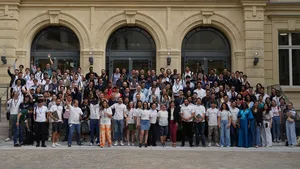Our ongoing efforts to support mental health

Mental health is a global crisis affecting an estimated one billion people. As a psychologist, I know how important it is to bring the issue out of the shadows and reduce the stigma often attached to it. For Mental Health Awareness Month in the U.S. here’s a look at some of the ways we’re helping.
How we help connect people to mental health resources
Three out of four people start their journey to find health information on the internet. And in moments of crisis, access to high-quality information is paramount.
That’s why on Google Search we recently expanded information about suicide, domestic violence and sexual assault hotlines to people in dozens of countries and languages. This year we’ll build on coverage across these features with 20 additional countries and territories, including Puerto Rico and Thailand, helping more people connect with local resources when they need it most.
Puerto Rico is one of many countries where people can get help via hotlines.

And as searches for “mental health crisis” continue to climb year after year, it’s easier to find clinically validated self-assessments for depression and anxiety in more countries. Now in Japan, Mexico and India, you’ll see a link to self-assessments in the Knowledge Panel for those conditions.
YouTube’s work to support wellbeing
Sharing stories about how others cope with and manage mental health issues can provide inspiration and help reduce stigmas that often deter people from getting help. In the U.S., UK, Canada and Australia, people searching for depression-related queries on YouTube will discover content about personal experiences alongside content from authoritative health organizations. Certain queries related to suicide, self-harm and eating disorders will also bring up a crisis resource page with ways to get help and an opportunity to pause before continuing on.

YouTube also introduced safeguards limiting repeated recommendations of certain content to specifically support the wellbeing and mental health of young people. For example, while some types of content may seem innocuous in a single view, experts have found that repeatedly viewing some types of content can be problematic for young people, such as content that displays social aggression, compares physical features or idealizes some body types, fitness levels or weight over others.
There are a range of additional controls and protections — from reminders to take a break or head to bed to restricting content that is inappropriate for younger viewers.
Useful features to improve your wellbeing
Many factors contribute to mental health, including physical wellbeing. Fitbit and Pixel can help you keep a pulse on these aspects of your health by providing insights and actionable ways to manage what’s going on — from understanding your heart health to getting a restorative night's sleep to making the most out of your daily run.

For example, Fitbit can help connect your psychological experience to your physiological stress response with our Body Response feature on Pixel Watch 2. This feature is powered by a continuous electrodermal activity (cEDA) sensor and can point to possible signs of stress using a machine learning algorithm. When the algorithm picks up on physical indicators of positive and negative stress, you will get a notification prompting you to log how you felt or take action like a guided breathing or a mindfulness session.
Helpful ways to navigate the right care at the right time
Finding information about mental healthcare options across state agencies can take work. Google Public Sector is partnering with the state of Illinois to set up an online portal so local families can have easier access to mental healthcare options for children. The new online portal named BEACON, short for Behavioral Health Care and Ongoing Navigation, will use artificial intelligence to better route families to the care they need.
Scaling mental health support in communities
Over the last five years, Google.org has provided more than $10 million to help nonprofits accelerate work related to mental health. One of those organizations, ReflexAI, used funding and support from Google.org Fellows to launch HomeTeam. This AI-powered, interactive educational program gives veterans the skills they need to have conversations about mental health with other veterans. Since debuting last November, hundreds of service members have used the tool and 100% of survey respondents said they felt better prepared to tackle conversations with their peers who might be struggling with mental health.
We also recently announced a $20 million commitment to support organizations' commitment to digital wellbeing for kids and teens. With partners like Highlights for Kids and Sesame Street, we’re helping kids build safe, healthy, and productive relationships with technology.
How we support mental health for Googlers and their families
In our workplace, this month is an opportunity to continue our ongoing conversations around wellbeing and spotlight resources available to employees and their families every day of the year. Our medical plans are designed to cover mental health services, our Employee Assistance Program provides counseling in times of need and we offer training to managers to better support employees struggling with their mental health. In the U.S., our Google Health & Wellness Center program is expanding access to on-site licensed counselors and clinical psychologists.
Good mental health is important to our overall health and wellbeing. We want to do our part to see that people have help when they most need it.







